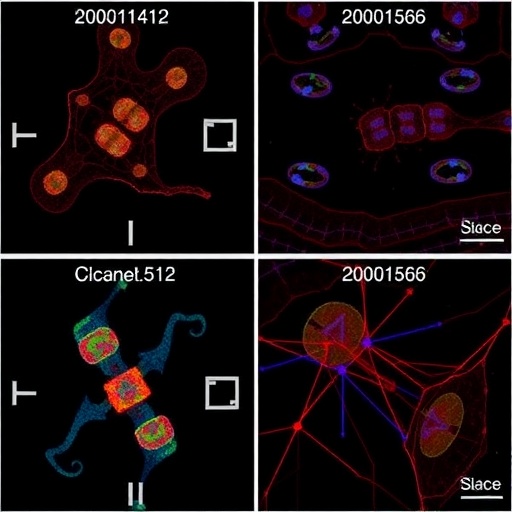
In a remarkable advancement for equine genetics, researchers have published a study that reveals critical insights into the genetic factors affecting hoof strength in Standardbred trotters. This research, highlighted in BMC Genomics, specifically examines how particular genes contribute to the structural integrity of horses’ hooves, enabling these athletic animals to compete effectively in barefoot racing conditions. The implications of these findings are far-reaching, promising to elevate the performance and welfare of racehorses while addressing longstanding challenges associated with their management and care.
The notion of barefoot racing for Standardbred trotters has gained popularity over recent years, as it emphasizes the importance of natural hoof function and overall equine welfare. However, the transition from traditional shod racing to racing without shoes presents unique challenges. The hooves must not only endure the physical strain of racing but must also be capable of maintaining optimal health despite exposure to diverse racing surfaces. This study’s emphasis on identifying genetic components capable of enhancing hoof strength is a progressive step toward solving issues that can hinder performance and lead to injuries.
Through sophisticated RNA-sequencing analysis, the research team was able to identify several key genes that play a vital role in influencing hoof strength. By examining the expression profiles of these genes, the researchers revealed distinct patterns that correlate with the ability to withstand the rigors of barefoot racing. This molecular insight equips breeders and trainers with the knowledge needed to select horses possessing genetic attributes that favor hooves well-suited to racing without shoes.
Hoof care has long been a topic of debate among equine veterinarians, trainers, and owners. Traditional wisdom often pitted the benefits of shoeing against the purported advantages of natural hoof care. However, with developments such as the ones described in this study, there is now a scientific basis for making informed decisions regarding hoof management. By focusing on the genetic predispositions that enhance hoof durability, practitioners can integrate genetic testing into routine breeding and training protocols.
Beyond the immediate impact on racing performance, this research could have a profound impact on equine health. Healthy hooves are vital not only for preventing injuries but also for overall horse well-being. By pinpointing genetic factors integral to hoof strength, this study opens avenues for developing targeted interventions and treatments, potentially reducing the incidence of hoof-related disorders. The synergy between genetics and hoof care reveals itself as a burgeoning field within veterinary science, one that holds promise for the future of equine sports.
Interestingly, the application of genetics in hoof care extends beyond the racing industry. Recreational riders and various equestrian disciplines can benefit from discovering which genetic traits to prioritize when selecting horses. The presence of strong hoof-related genes could make a significant difference in horses’ longevity, performance, and even their adaptability to different environments. By enabling better-informed breeding decisions, this research has the potential to transform the equine industry at all levels.
Moreover, the study showcases the importance of interdisciplinary collaboration amongst geneticists, veterinarians, and equine specialists. Working together, they can further investigate the intricate relationships between genetic expression, environmental factors, and hoof health. As the study progresses beyond the initial findings, future research initiatives could explore how factors such as nutrition, exercise, and hoof management practices interact with genetic predispositions to shape hoof strength.
While the primary focus of the research identifies key genes, the scientific community stands to benefit from understanding how these findings can alleviate various challenges faced by Standardbred trotters and their owners. The intricate interplay between genetics and hoof quality not only fosters improved horse care practices but can also inform breeding programs and selection practices aimed at promoting overall equine health. As such, this breakthrough discovery enriches the landscape of horse racing and animal care exponentially.
In terms of methodology, the RNA-sequencing basis of this research cannot be underestimated. This technology allows for an accurate assessment of gene expression at unprecedented detail. With a comprehensive view of how different genes operate within the context of hoof health, researchers are now in a formidable position to advocate for scientifically robust breeding strategies that align with natural selection principles. The holistic approach taken by the researchers may inspire future studies aimed at unraveling other complex traits within equine genetics.
Furthermore, for trainers receptive to evolving practices, this new knowledge can inform nutritional support and conditioning programs aimed at optimizing hoof health. By understanding which genetic factors correlate with hoof strength, trainers can tailor their training regimens to suit the individual horse’s genetic predispositions. This could potentially lead to enhanced performance outcomes, fewer injuries, and a happier and healthier racehorse.
As the equine community continues to witness the intersection of technology and animal husbandry, the significance of this research will undoubtedly resonate across the industry. The advancements in equine genomics, particularly in integrating genetic analysis with practical care routines, represent a paradigm shift towards a more science-based and welfare-oriented approach to horse management. As awareness of genetic influences on equine health grows, so too will the demand for comprehensive genetic testing in the sector.
In conclusion, the implications of the RNA-seq analysis revealing key genes that enhance hoof strength in Standardbred trotters are profound. This study has the potential to reshape breeding practices, enhance hoof care methodologies, and ensure greater welfare for racing horses. The findings reinforce the idea that the future of equine sports lies not only in athletic prowess but also in the harmony of nature, science, and responsible horse management. With continued research and engagement from all stakeholders, the evolution of understanding within the domain of equine genetics holds the promise of unparalleled advancements in the horse racing world.
Subject of Research: Genetic factors influencing hoof strength in Standardbred trotters.
Article Title: RNA-seq analysis identifies key genes enhancing hoof strength to withstand barefoot racing in Standardbred trotters.
Article References:
Schwochow, D., Alameddine, A., Spörndly-Nees, E. et al. RNA-seq analysis identifies key genes enhancing hoof strength to withstand barefoot racing in Standardbred trotters.
BMC Genomics 26, 751 (2025). https://doi.org/10.1186/s12864-025-11814-4
Image Credits: AI Generated
DOI:
Keywords: Equine genetics, hoof strength, RNA-seq, Standardbred trotters, barefoot racing.
Tags: athletic performance in horsesbarefoot racing advantageschallenges of barefoot racingequine geneticsequine welfare in racinggenetic factors in horse healthhoof health managementhoof strength improvementperformance enhancement in racehorsesRNA-sequencing in equine researchStandardbred trottersstructural integrity of horse hooves




